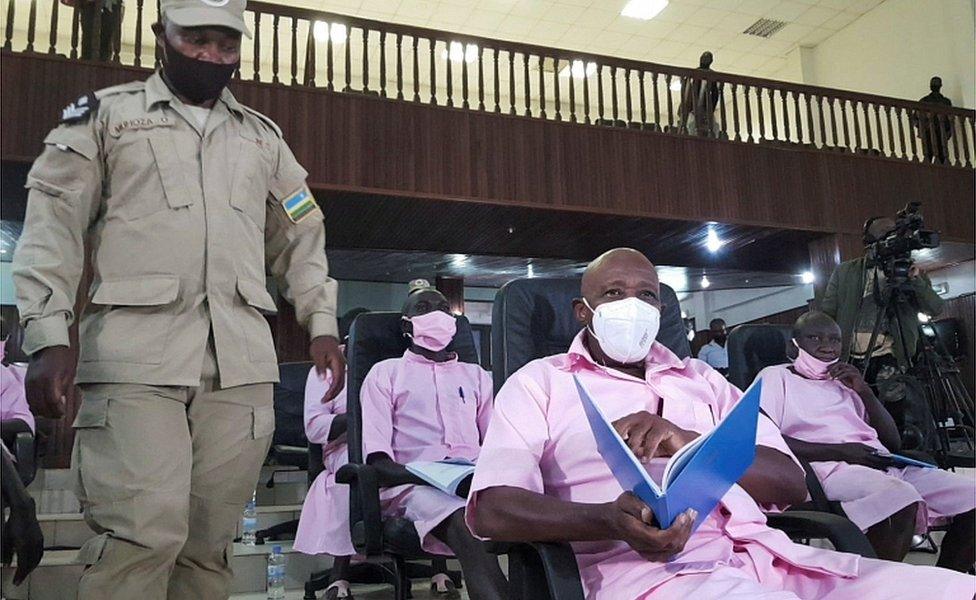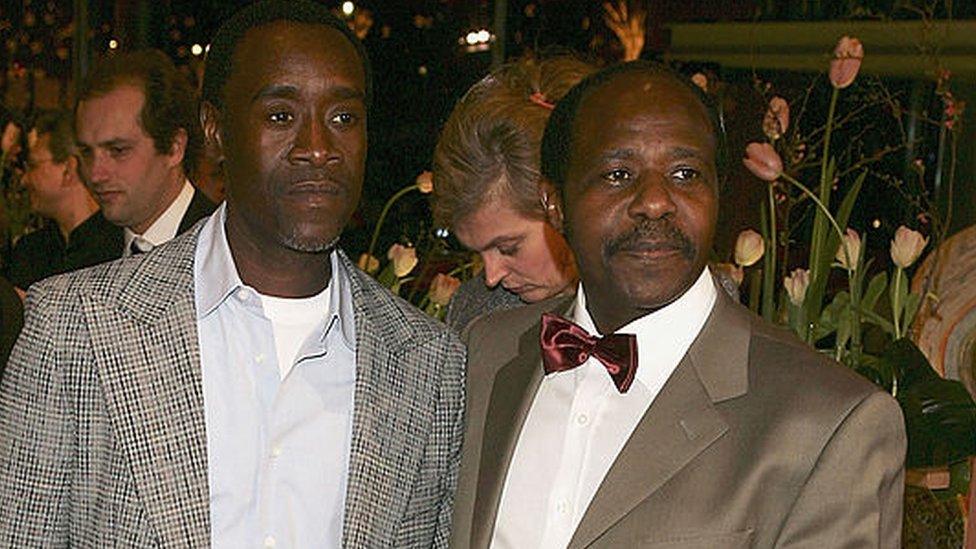Hotel Rwanda hero Rusesabagina in court on terrorism charges
- Published

Paul Rusesabagina (front right) appeared in court in Kigali on Wednesday
The man portrayed as a hero in a Hollywood movie about the Rwandan genocide has appeared in court at the start of his terrorism trial.
Paul Rusesabagina's lawyers have denied the charges against him.
Mr Rusesabagina is a fierce critic of Rwanda's President Paul Kagame, and had lived in exile in the US.
He says he was abducted in Dubai last year and flown to Rwanda. The authorities say he was arrested under an international warrant.
Mr Rusesabagina, 66, became famous after Don Cheadle played him in the 2004 film Hotel Rwanda, which depicts his efforts to save hundreds of people from being murdered during the 1994 genocide.
He left Rwanda in 1996 and sought asylum in Belgium. He later obtained a green card for the US.
While living in exile, he became the leader of Rwanda's opposition MRCD group. It has an armed wing, the FLN, which stages attacks in Rwanda.
What happened in court?
Mr Rusesabagina appeared at the high court in the Rwandan capital Kigali on Wednesday alongside 20 others accused of supporting the FLN.
He told the court that he was not Rwandan but "a Belgian hostage". He said that his arrest, rendition and trial were illegal.
"I was kidnapped and even now I am held hostage," he said.
Mr Rusesabagina said he had handed in his Rwandan identity documents in 1996 when he arrived in Belgium, and had never reclaimed his Rwandan nationality.
Prosecutors say Mr Rusesabagina's parents were Rwandans and they maintain that he never renounced his citizenship.
The trial will resume on 26 February.
What is he accused of?
Mr Rusesabagina is facing 13 charges, including terrorism, financing terrorism, recruiting child soldiers, kidnapping, arson, and forming terrorist groups.
During his first court appearance in September, he refused to enter a plea. Previously his lawyers had denied the charges.

Don Cheadle (L) played Mr Rusesabagina (R) in the film
Mr Rusesabagina said he had been tricked by a pastor in August 2020 into taking a trip to Burundi which he believed was for speaking engagements.
He left his home in San Antonio, Texas, and flew to Dubai. Mr Rusesabagina said he then boarded a private plane which he thought was going to Burundi's capital, Bujumbura. Instead, the plane landed in Kigali.
Mr Rusesabagina said that he was kidnapped, his legs and arms were tied and he was blindfolded before landing.
However, Rwandan officials said Mr Rusesabagina was arrested under an international warrant for leading "terrorist movements". Prosecutors denied he had been kidnapped, insisting due process had been followed.
What was the film Hotel Rwanda about?
The film is set during the Rwandan genocide in 1994.
In just 100 days about 800,000 people were slaughtered in Rwanda by ethnic Hutu extremists.
They were targeting members of the minority Tutsi community, as well as their political opponents, irrespective of their ethnic origin.
The film followed Mr Rusesabagina's effort, as a hotel manager and ethnic Hutu, to convince military officials to secure a safe escape for an estimated 1,200 people who sought shelter at his five-star Mille Collines Hotel in Kigali.
How was he viewed after the genocide?
Mr Rusesabagina has been internationally recognised for his humanitarian efforts, receiving several human rights awards, including the US Presidential Medal of Freedom.
But he did not receive that same level of admiration in his own country, where authorities and some survivors of the genocide questioned the veracity of his version of events at the Mille Collines, where he was the manager.
Rwandan genocide survivors' group Ibuka has in the past said that he exaggerated his own role in helping hotel refugees escape the 100-day slaughter.

You may also be interested in:
Between April and July 1994, an estimated 800,000 Rwandans were killed in the space of 100 days.
